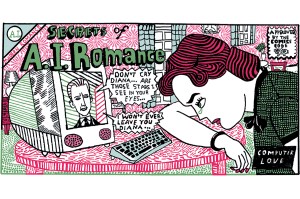Sometime in the mid-2010s, a conspiracy theory called the “dead internet theory” started circulating on the darker parts of the web. It made its way to 4chan’s /x/ board in 2020 and from there it has gained traction. The theory posits that the internet will eventually become entirely devoid of genuine human activity and that all online content, interactions and accounts will be generated by bots, AI or automated systems rather than real people. The conspiracy is that the entire internet is a government-manipulated psy-op used to influence public opinion, control news narratives or boost engagement metrics for commercial or political purposes.
The terrible reality is that dead internet theory isn’t wrong. It’s becoming true, more and more so all the time. Whether you credit “the Man” or capitalism for scraping human intelligence and rendering us obsolete, if you’ve been online you can feel that drift toward unconsciousness, right? It feels broken, or as if the algorithms aren’t working, or like people just aren’t engaging like they used to.
There is a lot of proof that the internet is dying. According to a report by cybersecurity company Imperva last year, just under half the previous year’s internet traffic came from non-human sources. Half! And that percentage is increasing exponentially.
If we aren’t dead inside already, tech is doing it’s best
AI is everywhere you look. An AI-generated YouTube short of a baby “surviving a plane crash and saved by a puppy” has more than 400 million views. It also has more than 27,000 comments that mostly look AI-generated. It’s AI talking to AI.
Another recent example is a band called the Velvet Sundown that has 300,000 Spotify listeners a month. The band appears to be completely fake. The photo of the group and the album cover are AI-generated. It’s no wonder that people are starting to ask whether this sort of content will be pushed by platforms to minimize the amount of money they have to pay artists.
Already, a woman on TikTok has claimed one of Velvet Sundown’s songs was the first to pop up on her Discover Weekly playlist on Spotify. There is a revolt against the “slop,” as youngsters refer to AI-generated crap. When someone posts it, the comments will just read: “SLOP SLOP SLOP SLOP SLOP GARBAGE.” The hatred people have for it warms my heart.
Humans don’t like being embarrassed. We don’t like being wrong. People don’t want to send something out and have their audience or friends or family members tell them it’s fake.
We hate being manipulated and we really, really don’t like uncertainty. We definitely dislike having to question what’s real and what’s not all day, every day. As slop has become pervasive and more difficult to detect, people are starting to back away from the internet.
Humans are beginning to have an “Uncanny Valley” response to the internet as a whole – a negative reaction toward objects that seem, but aren’t quite, human. And that’s because the internet is dead. It’s a zombie, a ghost in a machine. Real people aren’t engaging; if present at all, they’re allowing the content to wash over them or play in the background like white noise.
The zombie apocalypse is already happening online. And it is why humans are forced to interact and exist behind gated communities such as Substack and OnlyFans and interact “face-to-face” on media outlets like Twitch or 2Way and livestreams. We are already building virtual holdouts – although the humanoids are at the gates.
The dead internet is coming for us in real life, too. If we aren’t dead inside yet, tech is doing its best.
My husband and I often talk about the freedom we had when we were kids. How we lived an analog youth before the internet and smartphones came along – and how that world we knew is gone. Even if we try to give our child a Gen X upbringing like we had, she still lives in a world of self-driving cars and Siri. She is likely to be begging for a phone at age nine. It will be a battle we fight valiantly. She will hate us for our steadfast refusal to allow her brain to become occupied by algorithms despite how “all my friends have one and besides, mom, you’re always on your phone.” And she won’t be wrong.
We lived through the golden age of what the internet could be – when we were free to roam. We knew that most of the people we interacted with, shady perverts though they may have been, were actually people. This was similar to our experience in the outside world. Roam free. Don’t take candy from strangers. There are bad people, online and off. At least they were real.
We aren’t engaging in person anymore. Many don’t even want to. Waymos are everywhere in Austin. When I ask people who use them why they do so, the first thing they say, almost every single time, is, “It’s great! I don’t have to talk to anyone!” They’re so happy about it. Am I out of touch for finding that depressing?
I don’t think I am because other people are sick of it, too. We’re seeing a marked return to analog pleasures. Lots of people are launching magazines. Record sales are up: our last stand against the slop.
But it has an air of the Alamo to it all, because then I see the story of the guy who cried after proposing to his ChatGPT girlfriend – while he had a real-life girlfriend and daughter – and I say to myself, “Chat, are we cooked?”
This article was originally published in The Spectator’s August 2025 World edition.


























Leave a Reply